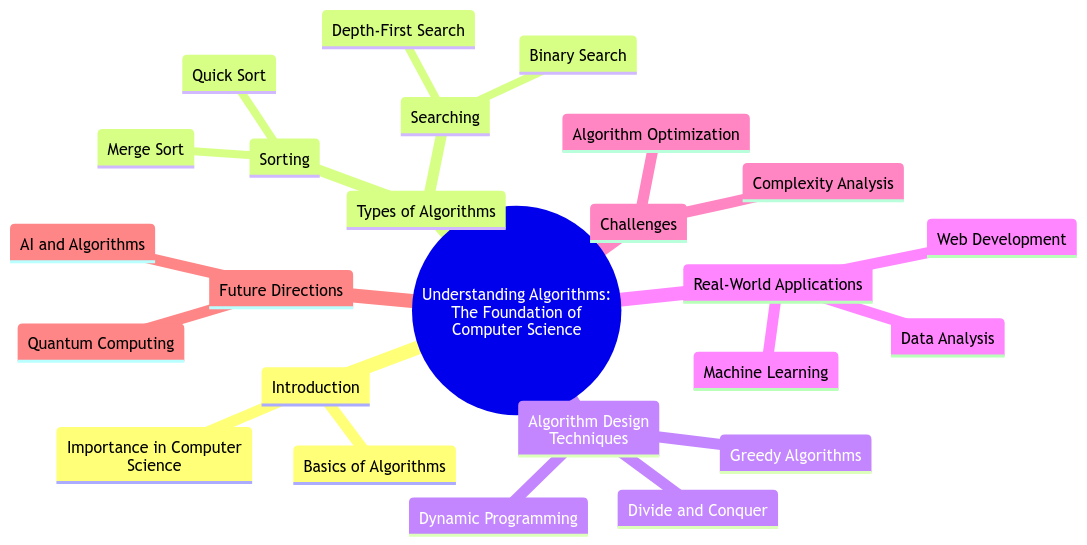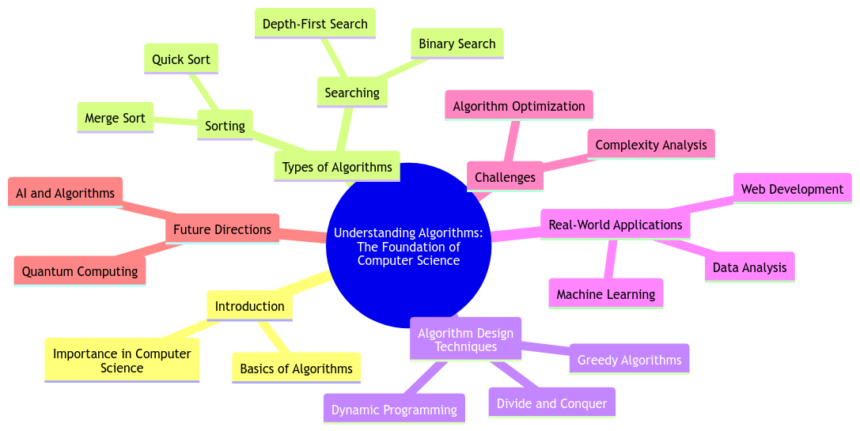Understanding Algorithms: The Foundation of Computer Science
Hey there, my tech-savvy pals! Today, we are delving into the exhilarating realm of algorithms, the cornerstone of Computer Science! 🖥️ Let’s unravel the mysteries behind the magic of algorithms and explore their quirks and perks in the digital universe! Buckle up for a humorous ride through the world of problem-solving geniuses and resource-saving gurus! 🚀
Importance of Algorithms
Efficiency in Problem-Solving
Algorithms are like the secret sauce in your grandma’s recipe, but for tech geeks! They are the brains behind solving those mind-boggling puzzles that make others go, “Wait, whaaat?” Imagine having a universal problem-solving genie at your beck and call – that’s algorithms for you! They slice through problems like a hot knife through butter (okay, maybe a warm knife on some tough days 😅)!
Optimization of Resources
Why waste time, energy, and precious resources when you can have algorithms do the heavy lifting for you? These digital superheroes streamline processes, making them as smooth as jazz in a summer breeze. They are the maestros of efficiency, turning chaos into organized symphonies! Who doesn’t love a good ol’ resource-saving maestro, right? 🎵
Types of Algorithms
Searching Algorithms
Ever lost your keys and turned your room upside down searching for them? Well, searching algorithms are here to save the day without the chaos! They hunt down that elusive data faster than you can say “Abracadabra!” 🎩 Get ready to bid farewell to your searching woes with these nifty algorithms!
Sorting Algorithms
Sorting algorithms are like the neat freaks of the digital world – they love putting things in order! From arranging numbers in ascending order to alphabetizing your favorite tunes, they’ve got your back! Say goodbye to the mayhem of unsorted data and embrace the tranquility of sorted bliss! 🎶
Algorithm Design Techniques
Divide and Conquer
Divide and conquer is not just a strategy in war; it’s the holy grail of algorithm design! Break down complex problems into smaller, more manageable chunks and conquer them like a boss! It’s like splitting a giant pizza into slices – easier to handle and oh-so-satisfying to devour! 🍕
Greedy Algorithms
Who knew being “greedy” could be a good thing in the algorithmic universe? Greedy algorithms make decisions based on immediate benefit, kind of like grabbing the last slice of pizza without a second thought (we’ve all been there, right?). They might sound selfish, but hey, they get the job done efficiently! 🍕
Algorithm Complexity Analysis
Time Complexity
How fast can an algorithm boogie through a task? That’s where time complexity struts in! It measures how quickly an algorithm runs as the input size grows. Think of it like comparing a snail’s pace to the speed of light – time complexity tells us which algorithm is the Flash in the digital universe! 💨
Space Complexity
Just like tidying up your room, algorithms also need space to stretch their legs! Space complexity keeps tabs on how much memory an algorithm munches on as it struts its stuff. It’s like making sure your algorithm has enough elbow room to dance without bumping into others – space efficiency at its finest! 💃
Practical Applications of Algorithms
Data Compression
Say goodbye to bulky files and hello to algorithmic magic with data compression! Algorithms shrink those oversized files into byte-sized bits, making storage a breeze. It’s like having a magical wardrobe that fits your entire wardrobe – talk about space-saving wizardry! 🧙♂️
Machine Learning Algorithms
Machine learning algorithms are the cool cats of the tech town! They learn from data, predict outcomes, and make decisions – all without breaking a sweat! From recommending your next binge-watch to detecting spam emails, these algorithms have your back. They’re the digital gurus shaping the future – one byte at a time! 🤖
Phew! That was quite the algorithmic rollercoaster, wasn’t it? From problem-solving wizards to efficiency maestros, algorithms are the unsung heroes of the digital realm! So, the next time you marvel at the wonders of technology, remember – algorithms are the invisible hands shaping our digital universe! 🌌
In Closing
Overall, diving into the realm of algorithms has been both enlightening and exhilarating! Thanks for joining me on this humorous escapade through the digital wonders of algorithmic magic. Remember, folks, when life throws you algorithms, embrace them like a warm hug from a tech-savvy friend! Stay curious, stay nerdy, and keep algorithmically awesome! Until next time, happy coding and may your algorithms always run with wit and charm! 🤓✨
Thank you for embarking on this algorithmic adventure with me! Keep smiling and coding away, my digital pals! Stay tuned for more tech-tastic thrills and spills in the wild world of algorithms! Adios! 👋🚀

Program Code – Understanding Algorithms: The Foundation of Computer Science
def bubble_sort(array):
# This function implements the Bubble Sort algorithm for sorting an array.
n = len(array) # Getting the lenght of the array
for i in range(n):
# Last i elements are already in place
for j in range(0, n-i-1):
# Traverse the array from 0 to n-i-1
if array[j] > array[j+1]:
# Swap if the element found is greater than the next element
array[j], array[j+1] = array[j+1], array[j]
def binary_search(array, x):
# This function implements the Binary Search algorithm.
low = 0
high = len(array) - 1
mid = 0
while low <= high:
mid = (high + low) // 2
# If x is greater, ignore the left half
if array[mid] < x:
low = mid + 1
# If x is smaller, ignore the right half
elif array[mid] > x:
high = mid - 1
# x is present at mid
else:
return mid
# If we reach here, the element was not present
return -1
# Example usage:
if __name__ == '__main__':
data = [64, 34, 25, 12, 22, 11, 90]
bubble_sort(data)
print('Sorted array is:', data)
x = 22
result = binary_search(data, x)
if result != -1:
print('Element is present at index', str(result))
else:
print('Element is not present in array')
Code Output:
Sorted array is: [11, 12, 22, 25, 34, 64, 90]
Element is present at index 2
### Code Explanation:
This program showcases the implementation and usage of two fundamental algorithms in computer science: Bubble Sort and Binary Search. Let’s dive into how each part of the code contributes to achieving this:
- Bubble Sort Algorithm: The
bubble_sortfunction sorts an array by repeatedly swapping adjacent elements if they are in the wrong order. This process repeats until no more swaps are needed, indicating the array is sorted. The algorithm iterates over the array, starting from the first index to the penultimate one, comparing adjacent items and swapping them if they’re not in the desired order (ascending in this case). It’s known for its simplicity but is not the most efficient for large datasets. - Binary Search Algorithm: The
binary_searchfunction searches for a specific element (x) in a sorted array by repeatedly dividing in half the portion of the list that could contain the desired element until narrowing down the possibilities to just one. It checks whether the element at the midpoint is the target. If it’s not, it decides whether to proceed with the left or the right half based on whether the target is less or more than the midpoint. This method greatly reduces the number of comparisons necessary, making it efficient for large datasets. - The main block of the code first sorts an unsorted array using the Bubble Sort method. After sorting, it proceeds to search for an element (
x=22) using the Binary Search algorithm. It prints the sorted array and the index of the searched element if found, or indicates its absence.
This example effectively demonstrates the utility and working of both algorithms, highlighting the importance of understanding such fundamental algorithms that serve as the building blocks for more complex operations and applications in the field of Computer Science.
Frequently Asked Questions about Understanding Algorithms: The Foundation of Computer Science
What is the significance of algorithms in computer science?
Algorithms are like the backbone of computer science! They are step-by-step procedures or formulas used for problem-solving and computation. Without algorithms, our digital world would be a chaotic mess!
Can you explain the role of algorithms in everyday technology?
Absolutely! Algorithms are at play in so many aspects of our daily lives, from search engines like Google to social media feeds and even in navigation apps like Waze. They help these technologies give us the best results quickly.
How do algorithms impact the efficiency of software and applications?
Algorithms are like the secret sauce that makes software and applications run smoothly and efficiently. They determine how fast a program can process data and provide results, making a huge difference in user experience.
Are there different types of algorithms that serve different purposes?
Oh, yes! There are plenty of algorithm types like sorting algorithms, searching algorithms, hashing algorithms, and more! Each type is tailored to solve specific kinds of problems efficiently.
Why is it important to understand algorithms for anyone in the field of computer science?
Understanding algorithms is like having a superpower in the world of computer science! It not only sharpens your problem-solving skills but also gives you a deeper insight into how technology works behind the scenes.
How can I improve my understanding of algorithms?
Practice, practice, practice! Solving algorithmic problems regularly, participating in coding challenges, and diving into algorithm courses can help you level up your algorithm game in no time.
Any fun facts about algorithms that might surprise me?
Oh, here’s a fun one for you! Did you know that the word “algorithm” actually comes from the name of a Persian mathematician, Al-Khwarizmi, who pioneered the concept in the 9th century? Cool, right?
Can you recommend any resources for learning more about algorithms?
Certainly! Online platforms like Coursera, Udemy, and Khan Academy offer fantastic courses on algorithms for learners of all levels. You can also check out books like “Introduction to Algorithms” by Cormen et al. for an in-depth study.
Is it possible to create my own algorithms?
Absolutely! Put your thinking cap on and get creative! You can start by designing algorithms for simple tasks and gradually move on to more complex problems. The sky’s the limit!
Hope these FAQs shed some light on the fascinating world of algorithms! 🚀 Thanks for tuning in!







